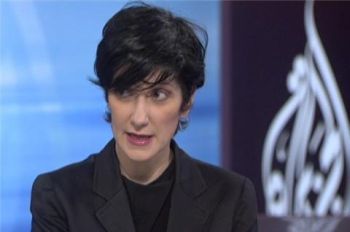
Publisher:
Bonnie King
CONTACT:
Newsroom@Salem-news.com
Advertising:
Adsales@Salem-news.com

~Truth~
~Justice~
~Peace~
TJP
May-22-2011 12:40


 TweetFollow @OregonNews
TweetFollow @OregonNews
Dorothy Parvaz: Inside Syria's Secret Prisons
Salem-News.comAl Jazeera correspondent could clearly hear interrogator pummelling his fists into his subject.'
 Dorothy Parvaz |
(WASHINGTON D.C. Al Jazeera) - I was standing in two fist-sized pools of smeared, sticky blood, trying to sort out why there were seven angry Syrians yelling at me. Only one of them - who I came to know as Mr Shut Up during my three days in a detention center, where so many Syrians 'disappeared' are being kept - spoke English.
Watching them searching my bags, and observing the set of handcuffs hanging from the bunk bed wedged behind the desk in the middle of the room, I guessed that I was being arrested - or, at the very least, processed for detention.
"Why are you doing this?" I asked.
"Shut up! SHUT UP!" said Mr Shut Up.
I'd arrived there moments before, dragged by a handful of hair from a car where I'd been wedged between two armed men. They'd tried to convince me that they were taking me to my hotel, but, of course, I knew that there was no way plain-clothed security personnel would be kind enough to escort me to my accommodation.
I did, however, manage to resist being forced to wear a blindfold, figuring that if they were going to shoot me, they really didn't need a reason to do so.
After about 20 minutes, we pulled off the highway and through two checkpoints. By this point, the rather handsy security guard to my left had pulled my scarf over my eyes.
Armed guards opened a gate to what seemed like a military compound, filled with dozens of men, all plain-clothed, lurking in an atmosphere suited only to cracking skulls - so heightened was the sense of impending violence.
 |
I'd ended up there because a scan of my luggage had revealed that I had a satellite phone and an internet hub with me - the commercially available type, nothing special, and just the sort of thing one might need while travelling in a country with spotty communications.
Still, if that was deemed suspicious, then my American passport, complete with its Al Jazeera-sponsored visa, sealed the deal. The agents couldn't seem to agree what I was, or which was worse: an American spy for Israel, or an Al Jazeera reporter – both were pretty much on a par.
Blindfolded, I was led to the first of my three cells - a tiny, sparse room, roughly three paces across and five length-wise. On the floor, on a ratty brown blanket, sat a young woman whose face was puffy from crying. She said she was 25 and from Damascus and indicated that she had been there for four days. She didn't know why she'd been picked up by the Mukhabarat, the Syrian intelligence service.
She said she was a shop assistant in a clothes store, and the designer stilettos that sat in the corner of the cell seemed to belie any suggestion that this was a girl who had left her house in order to participate in protests. She said she'd been speaking on her phone when she was hauled into a car, blindfolded and driven away.
She had no idea where she was, or how long she was to stay there. She had not been allowed to contact her family.
Our eyes moved to the month-long calendar etched on the wall, likely the artwork of a previous dweller. With unspoken glances, we each wondered how long she would remain there.
A man came to the door a couple of times before he took me from the cell, handcuffed and blindfolded me, and led me to what seemed like a courtyard.
He pushed me up against a wall and told me to stand there. As I did so, I heard two sets of interrogations and beatings taking place, about 10 meters away from me in either direction.
The beatings were savage, the words uttered by those beaten only hoarse cries – "Wallahi! Wahalli!" ("I swear to God! I swear to God!") or simply, "La! La!" ("No! No!").
I stood there for what seemed like an eternity, before someone approached me.
"Who do you work for?" he hissed.
"Al Jazeera. Online."
"Are you alone?"
"So alone."
I was taken to a second cell, this one, with smears of blood on the wall. I found what looked like a bloodless corner and perched until called upon again – at around midnight.
I was again handcuffed, but this time, before the blindfolds went on, I caught sight of a young man, no more than 20, chained to a radiator outside the hallway. He had a legal pad on his knees, was blindfolded, and was quivering so fiercely he could hardly hold the pen with which he was probably meant to ink some sort of confession.
Meanwhile, the beatings and cries outside continued.
I was taken through a labyrinth of stairs, before entering an office where my interrogator awaited me. I managed to talk him into allowing the blindfolds to be removed.
The man - let's call him 'Firass' - was slightly portly and could be affable when he wanted to be (he seemed concerned that there were women being kept at the facility, and tried to make things comfortable for me).
Firass even apologised for the fact that our "formal interview" was taking place in a room containing a bed, crates of potatoes and a refrigerator.
"It's just that we’re so busy these days," he said.
I wanted to ask why the Mukhabarat would be so busy if such a tiny minority was causing problems, but it didn't seem like a prudent moment.
Firass spoke very good English and, at first, seemed convinced that I was a spy.
Then he focused on Al Jazeera, putting the network on the same level as Human Rights Watch. The network had been making a "big problem" for Syria with the UN Security Council, he said.
After four hours of questioning, he sent me to a different room, this one a long-disused office where a terrified teenage girl was sleeping on the couch.
The next morning, my new roommate and I tried to get acquainted, without sharing too many details, as we had been forbidden to do so. She too had been plucked from the streets of a Damascus suburb for reasons she couldn’t understand.
She'd been there for eight days when I met her, and she looked ill. The food we were given three times a day - fetid, random and at times, rotting - mostly had the effect of making her vomit, but she was too hungry to stop eating all together.
There was a doctor on site, parked next to a sign that read "Assad is Boss", but the girl seemed too frightened to see the doctor - no wonder.
Most of the our days were spent listening to the sounds of young men being brutally interrogated – sometimes tied up in stress positions until it sounded like their bones were cracking, as we saw from our bathroom window (a bathroom with no running water, except for one tap in a sink filled with roughly 10 cm of sewage).
One afternoon, the beating we heard was so severe that we could clearly hear the interrogator pummelling his boots and fists into his subject, almost in a trance, yelling questions or accusations rhythmically as the blows landed in what sounded like the prisoner's midriff.
My roommate shook and wept, reminding me (or perhaps herself) that they didn't beat women here.
There was a brief break before the beating resumed, and my first impulse was to cover my ears, but then I thought, "If this man is crying, shouldn’t someone hear him?"
After all, judging from the sound of passing traffic and from what I could see through our window, there were no homes nearby – just a highway, a sprawling old security compound, and what appeared to be an old prison; a few official buildings that had seen better days. That's all I could see from our cell.
When one of the Mukhabarat agents came in, my teenage cellmate proceeded to beg him to allow her to use her mobile phone to call her parents, which, of course, was not going to happen.
She asked about the beatings we'd heard outside, and was told that the men being punished were murderers who had shot people in Deraa.
Later, Mr Shut Up came and took my roommate away for interrogation, which made me worry. She returned an hour later, with no apparent resolution to her problem. She still looked out the window and cried, worrying about her parents, wondering if or when she'd see them again.
I couldn't help but wonder: what sort of threat does this girl pose to the Syrian state that they have to keep her in this rotting room? What are they so afraid of?
After three days, Firass told me I was free to return to Qatar – something for which I was very grateful.
He even took me to his boss's office – again, remember, no one has any names here – where I was given a lecture on Al Jazeera’s coverage of the troubles in Syria, mostly focusing on how a tiny, tiny minority was causing a problem for an essentially happy majority.
On my way out of the compound, I was finally allowed to see it for what it was – a shabby set of offices and cellblocks with pictures of Bashar al-Assad, Syria's president, framed in the sort of metallic stands that might promote two-for-one-drinks offers at the theatre, placed every few metres. The effect was farcical.
I was taken to the airport, but I was certainly not allowed to return to Qatar. Instead, I was dragged, kicking and screaming, onto a flight bound for Tehran (I'd entered Syria with an Iranian passport). Call it a strange brand of extraordinary rendition, if you will.
The Syrian authorities had alleged to the Iranians that I was a spy – a charge that can carry a death penalty in Iran.
Fortunately, in my case, the facts were borne out. After a couple of weeks of interrogations, the investigator in Iran charged with my case determined that I was not a spy, but a journalist.
On Wednesday, without drama or incident, I was released and put on a dawn flight from Tehran to Doha – it was a simple matter of a judge's approval.
Although I have written critically of some of Iran's policies, I was treated with respect, courtesy and care thoughout my detention there.
My room was spotless, my interrogator flawlessly polite, and the women who looked after me at the Evin Prison Women's Detention Centre saw to it that my every need was met – especially the sleeping pills I required, because every night, without fail, I would hear the cries of men screaming in Syria "Wallahi! Wallahi!" and wonder how their wounds will ever heal.
Source: Al Jazeera
Articles for May 21, 2011 | Articles for May 22, 2011 | Articles for May 23, 2011

Quick Links
DINING
Willamette UniversityGoudy Commons Cafe
Dine on the Queen
Willamette Queen Sternwheeler
MUST SEE SALEM
Oregon Capitol ToursCapitol History Gateway
Willamette River Ride
Willamette Queen Sternwheeler
Historic Home Tours:
Deepwood Museum
The Bush House
Gaiety Hollow Garden
AUCTIONS - APPRAISALS
Auction Masters & AppraisalsCONSTRUCTION SERVICES
Roofing and ContractingSheridan, Ore.
ONLINE SHOPPING
Special Occasion DressesAdvertise with Salem-News
Contact:AdSales@Salem-News.com

Salem-News.com:
googlec507860f6901db00.html

Terms of Service | Privacy Policy
All comments and messages are approved by people and self promotional links or unacceptable comments are denied.
[Return to Top]
©2025 Salem-News.com. All opinions expressed in this article are those of the author and do not necessarily reflect those of Salem-News.com.